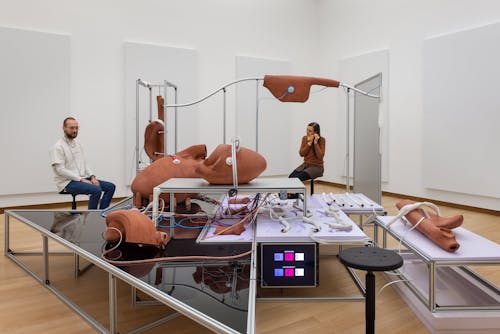Coralie Vogelaar
Interpersonal Biofeedback Apparatus Encoding Cardiac Fluctuations
Proximity Music: Echoes of Entropy
This interactive installation examines people’s urge to exert control over their body and the data systems that analyse their state of wellbeing. Visitors are invited to take a seat and place a sensor on their earlobe. Their heart rate will immediately become audible as the sound of ticking metal friction on ceramics and squeaking polystyrene. Through an algorithmic sound composition made in collaboration with Sjoerd Leijten, changes in heart rate impact the sound and vice versa – as if they’re musicians in a jazz session. While science often dismisses small variations in heart rate as irrelevant, this piece explores the “noise” that is usually filtered out. The set-up exudes the atmosphere of a test environment, with its aluminium tubing, visible cables, and its inbuilt, pre-programmed, and conditional rules.
Coralie Vogelaar is an interdisciplinary artist who combines scientific disciplines with artistic imagination. Vogelaar investigates the relationship between human and machine by applying machine logic to the human body. She often works collaboratively with experts from various fields, including data analysis, choreography, and sound design, culminating in performances, videos, and multimedia installations.
Interactive music composition: Sjoerd Leijten
Interaction sensors: Kees Reedijk
Ceramics: Europees Keramisch Werkcentrum (EKWC)
Research: TU/e Innovation Space, Louis Bonnaire
Rolling aluminium: Paul van Dongen, Bestbend
Assistance: Éloïse Alliguié, Elżbieta Szota
Advice: Antonis Pittas, Marjolein Vogels, Marloeke van der Vlugt, Wikke van Houwelingen, Marloes van der Hoek, Annika Kappner, Hendrik-Jan Grievink, Eva Villanueva, Yuri Veerman, Esmee Geerken, Minke Kampman, Wes Broersen.
Financial support: Mondriaan Fonds, Amsterdams Fonds voor de Kunst (AFK), Niemeijer Fonds, Stedelijk Museum Amsterdam
